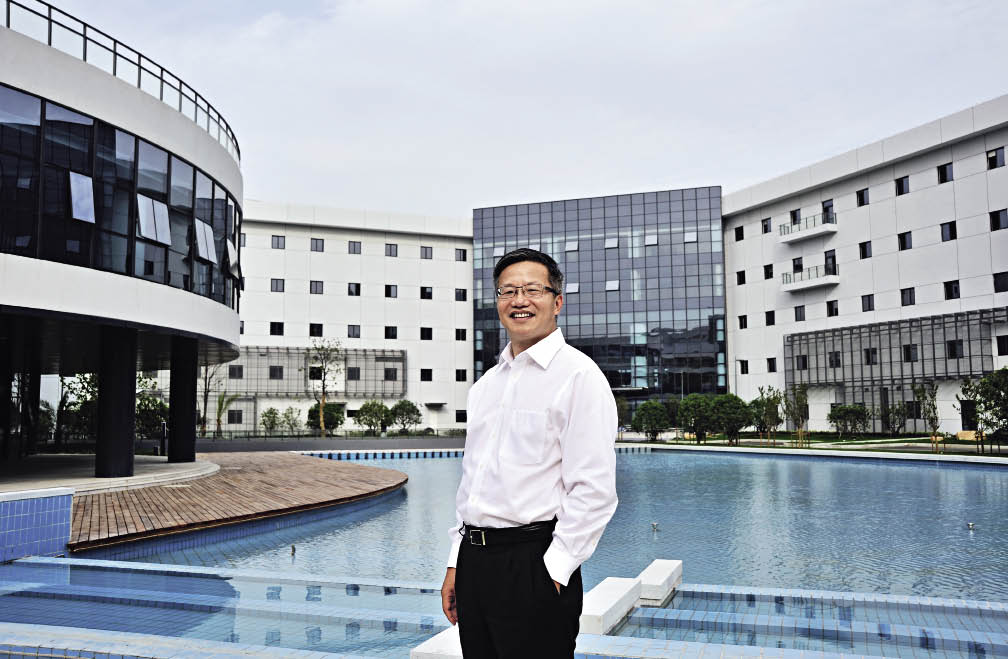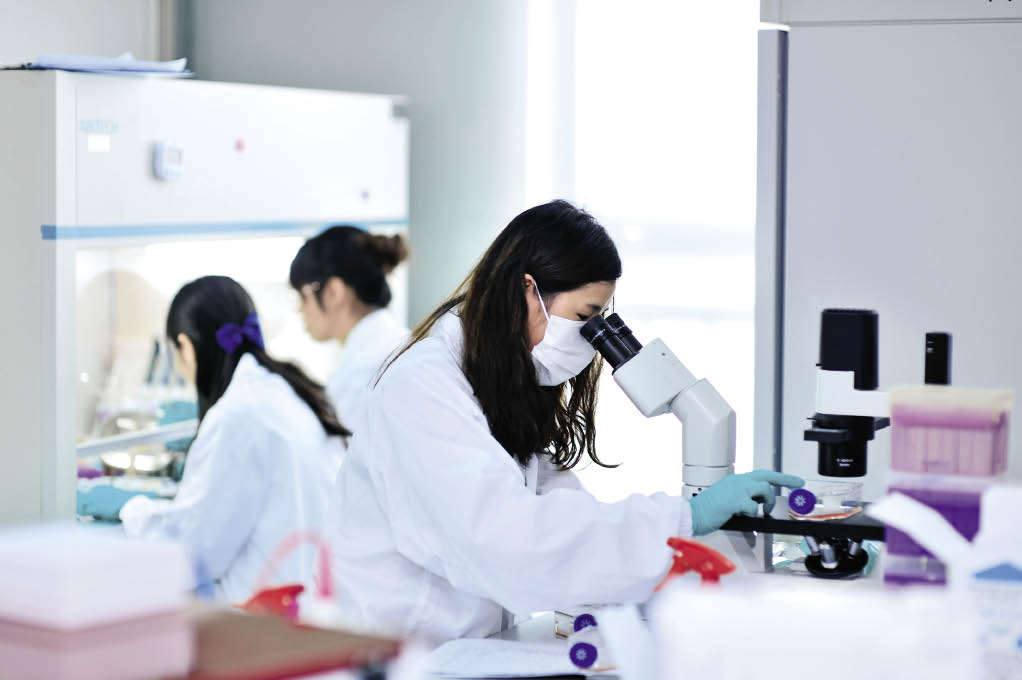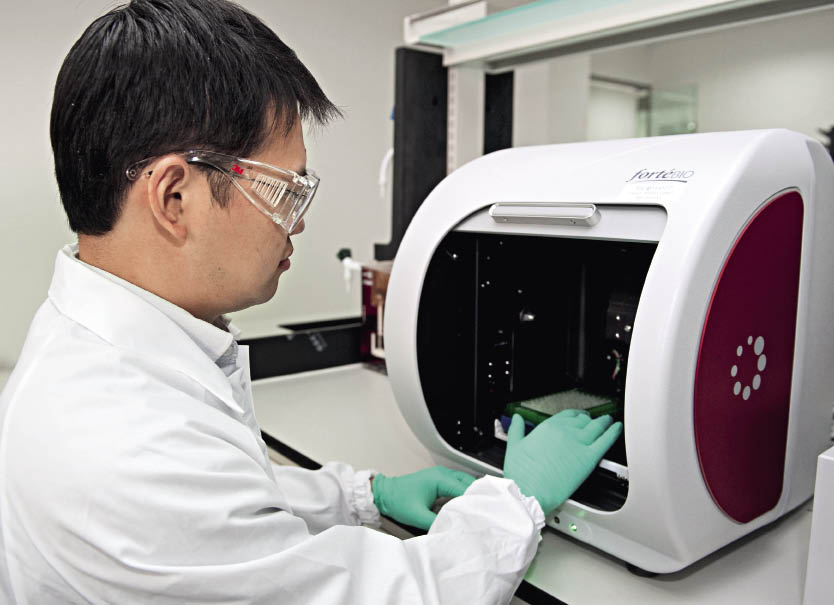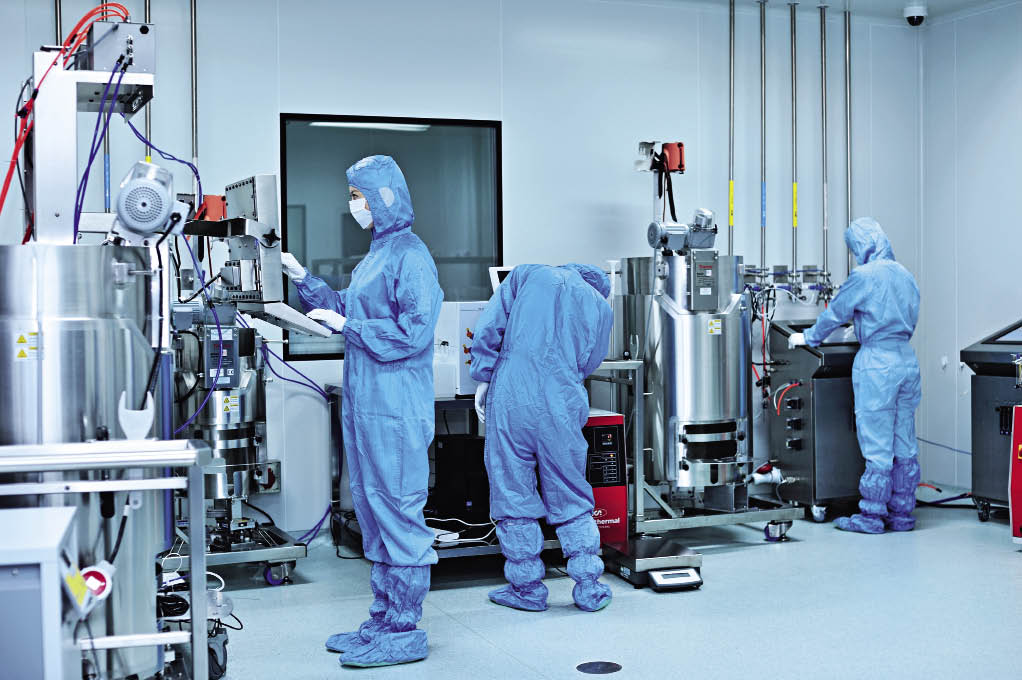By staff reporter GONG HAN
By staff reporter GONG HAN
AS a distinguished expert on China’s Thousand Talents Program, Yu Dechao is a heavyweight in the country’s biological pharmacy. As a major founder of Oncorine, the world’s first patented anti-tumor virus therapy drug, he also invented Conbercept, China’s first monoclonal antibody drug whose global intellectual property rights it owns. It is applied as an ophthalmic injection which restores light sensitivity to eyes blinded by age-related macular diseases or diabetes. In February 2014, at the annual meeting of the Bascom Palmer Eye Institute, Conbercept was acknowledged as the first high-end biological medicine to be developed outside the U.S.

Dr. Yu Dechao.
Yu resigned his high-paying job in the U.S. in 2006 and returned to China to establish Innovent Biologics in Suzhou in 2011. His mission was to make high quality biological medicine affordable for ordinary Chinese people.
From Cowherd to Scientist
Clad in a T-shirt bearing his company logo, this successful scientist and entrepreneur of biological medicine was more casually dressed than might be expected.
Born at the foot of Tiantai Mountain in Zhejiang Province, as a student Yu helped his family by chopping firewood and herding cows. In 1982 he was admitted to Zhejiang Forest College and majored in economic forestry, becoming the first undergraduate from his hometown.
In 1989, he was enrolled as a doctoral student of molecular genetics at the Chinese Academy of Sciences. For his post-doctoral degree he specialized in medicinal chemistry at the University of California in 1993. Upon graduation, he declined an invitation from Harvard University and served in a number of famous bio-pharmaceutical enterprises, such as Cell Genesis and Applied Genetics.
In the biological medicine field, modern genetic engineering technologies are used to develop new drugs. High in pharmacological activity and low in toxins and side effects, biological medicines are widely applied to treat tumors, diabetes and blood diseases. They have become a major success story in the global pharmacy market.
Oncorine, developed by Yu, is the world’s first anti-tumor virus drug. Using engineering baculovirus, it can accurately target tumors, while its ability to self-reproduce cracks cancer cells. The released antigens have the same effects on metastatic cancer cells. Compared with chemotherapy, drug therapy has significantly fewer side effects.

A biopharmaceutical R&D lab at Innovent Biologics.
In 2006 Yu gave up his senior management position in the U.S., and returned home to devote himself to domestic biological pharmacy. After seven years of research and experimentation, in 2013 he developed Conbercept which helps patients with fundus diseases to recover their sight within 24 hours.
Fundus is one of the top three diseases that causes blindness. As Chinese society grows older, tens of millions of senior patients suffer fundus macular degeneration and diabetic retinopathy. Before Conbercept appeared on the market, patients had no choice but to use expensive imported drugs from the U.S.
“People with normal vision cannot understand a blind people’s hunger for light, especially those who became blind later in life. In addition to the loss of one’s ability to look after oneself, one third of them suffer melancholia,” said Yu, who has witnessed the pain of many blind people.
According to professional clinical comparisons, Conbercept has a greater durability and stronger effectiveness than the drug produced by Novartis, and the price is only a quarter of its U.S. counterpart. This greatly reduced patients’ economic burdens, and as a result, Novartis lowered their price by RMB 2,000 per dose.
The happiness Yu’s career brings him comes simply, for example, from a phone call from an opthamologist, telling him that a blind patient could walk unaided after using the drug.
“My medicine helps others to change their lives. Words cannot express the kind of happiness this brings,” he said.
Because of its remarkable therapeutic effects, Conbercept is rated as one of China’s biggest scientific breakthroughs in ophthalmology over the past 50 years, as well as an innovative drug with the most clinical value. So far, it is China’s one and only domestic medicine to have been recognised by the World Health Organization (WHO).
China Is Catching Up
Yu is cognizant of the problems facing China’s biopharmaceutical industry. He told China Today that the share of biopharmaceuticals in the global pharmaceutical market is about 32 percent. However, the share of biopharmaceuticals in China’s pharmaceutical market is below 5 percent.
“There are eight biopharmaceuticals among the top 10 bestselling drugs in the world, but there is no biopharmaceutical listed on the top 10 bestsellers list in China,” said Yu.
Internationally, people usually adopt the bioreactor volume of mammalian cells to measure the capacity of a country’s biopharmaceutical industry. The figure is over 1.3 million liters for the U.S., and about 670,000 liters for South Korea, but only 30,000 for China.
“This small scale will surely lead to high costs, and unaffordable prices will exclude ordinary people from the fruits of the progress of the modern biopharmaceutical industry,” observed Yu. He further explained that, because of high prices, only about 4,000 among the more than 500,000 breast cancer sufferers in China can use the best medicine – a biopharmaceutical drug imported from the U.S.
Yu said he returned to China because on the one hand he wanted to build his own business. But on the other, he thought it a pity that China can produce almost everything, yet cannot create a drug recognized around the world, especially an advanced biopharmaceutical drug.
To promote the overall development of the industry, Yu has also actively participated in the making of laws, regulations, and standards in the field. Moreover, he has launched training sessions for employees of over 500 enterprises, including his competitors in the industry, helping them to understand and abide by the relevant standards.
“I hope that every player in the field can devote themselves to the business and make safe, effective and affordable drugs for ordinary people in our country. Making drugs is different from making cell phones or furniture. It is a test of our conscience,” said Yu.
Yu saw neighbors in his hometown with high blood pressure and diabetes succumb to sequelae such as hemiplegia, because they didn’t receive the most effective medicine. “I hope that one day I can tell them they can be cured through effective and affordable medicines and that they don’t need to worry,” Yu said.
From Yu’s point of view, to accelerate development and innovation in China’s pharmaceutical industry, efforts must be made in three areas – fundamental research, the evaluation and approval process, and the payments system.

A scientist carries out an experiment in the lab.
“Money is needed for research and development, which usually involves a huge investment, high risks and a long lead-in. Enterprises will gain incentive and capability only after they receive reasonable returns from sales of medicine, and stop making low-level investments to produce generic drugs,” said Yu.
In the past decade since Yu returned to China, he has seen the Chinese biopharmaceutical industry develop at a fast pace. China is catching up with the developed countries. “It is moving in the right direction, but still has a long way to go,” Yu said.
“The Chinese government has attached unprecedented importance to innovation today. It now focuses more on implementation of innovative plans. For example, the rules are more specific in the application of innovative technologies and scientific research personnel are able to own stock in a company,” Yu said.
“Made in China” Drugs Go Global
In March and October of 2015, Innovent signed with Eli Lilly – a U.S.-based Fortune 500 corporation – two strategic collaboration agreements to co-develop and co-commercialize six antibody drugs over the next decade. The transaction brought Innovent upfront and potential milestone payments of US $3.3 billion. The cooperation marked the first time that the biopharmaceutical drugs developed by a Chinese biotech company were recognized and sold on the international market. It has been the largest international cooperation in terms of the amount of money involved in China’s biopharmaceutical sector.

Innovent Biologics staff at work making biopharmaceuticals.
In addition, Eli Lily will pay Innovent sales commissions as high as 10-plus percent. What makes Yu feel even prouder is that the cooperation has changed the business model of China’s pharmaceutical industry.
In the past, Chinese pharmaceutical companies often had to make high investments in the first decade, and only received economic returns after the new drugs went on the market. However, if the company owns intellectual property, it can gain returns by granting rights to overseas partners to develop and commercialize the products outside China.
Yu told China Today that many investors around the globe are interested, as they are attracted by China’s large drug market and its bright prospects.
In June 2015, Innovent was selected as a representative of outstanding innovative enterprises in China. Yu was invited by the State Council to attend the Sixth U.S.-China Innovation Dialogue held in Washington D.C., where he delivered a speech about biopharmaceutical innovation in China.
“An American representative at the event said that no one would have expected Americans to buy a new medicine developed by Chinese. However, participants believe it is good that the two sides can cooperate and benefit the vast numbers of patients around the world,” said Yu.
So far Yu has claimed over 70 patentable inventions and is still working hard in this field. “Whenever I get an inspiration I conduct research to make further explorations. People who want to make new drugs are similar. We’re curious about the process of various diseases and want to learn more about them, with the expectation of finding ways to control and cure them. It is scientific curiosity that keeps leading us down new paths,” concluded Yu.